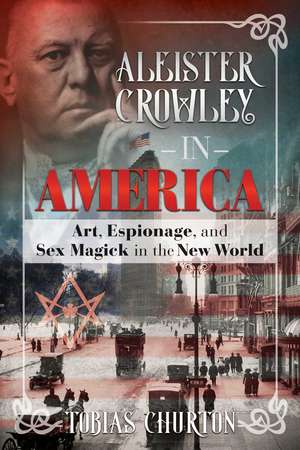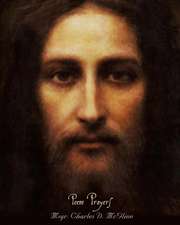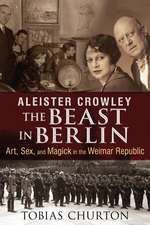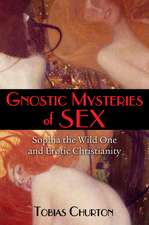Aleister Crowley in America: Art, Espionage, and Sex Magick in the New World
Autor Tobias Churtonen Limba Engleză Hardback – 11 ian 2018
An exploration of Crowley’s relationship with the United States
• Details Crowley’s travels, passions, literary and artistic endeavors, sex magick, and psychedelic experimentation
• Investigates Crowley’s undercover intelligence adventures that actively promoted U.S. involvement in WWI
Occultist, magician, poet, painter, and writer Aleister Crowley’s three sojourns in America sealed both his notoriety and his lasting influence. Using previously unpublished diaries and letters, Tobias Churton traces Crowley’s quest to implant a new magical and spiritual consciousness in the United States.
In 1914 Crowley returned to the U.S. and stayed for five years: turbulent years that changed him, the world, and the face of occultism forever. Diving deeply into Crowley’s 5-year stay, we meet artists, writers, spies, and government agents as we uncover Crowley’s complex work for British and U.S. intelligence agencies. Exploring Crowley’s involvement with the birth of the Greenwich Village radical art scene, we discover his relations with writers Sinclair Lewis and Theodore Dreiser and artists John Butler Yeats, Leon Engers Kennedy, and Robert Winthrop Chanler. We experience his love affairs and share Crowley’s hard times in New Orleans and his return to health, magical dynamism, and the most colorful sex life in America. his role in the sinking of the passenger ship Lusitania, his making of the “Elixir of Life” in 1915, his psychedelic experimentation, and his run-in with Detroit Freemasonry. We also witness Crowley’s influence on Scientology founder L. Ron Hubbard. We learn why J. Edgar Hoover wouldn’t let Crowley back in the country and why the FBI raided Crowley’s organization in LA.
Offering a 20th-century history of the occult movement in the United States, Churton shows how Crowley’s U.S. visits laid the groundwork for the establishment of his syncretic “religion” of Thelema and the now flourishing OTO, as well as how Crowley’s final wish was to have his ashes scattered in the Hamptons.
• Details Crowley’s travels, passions, literary and artistic endeavors, sex magick, and psychedelic experimentation
• Investigates Crowley’s undercover intelligence adventures that actively promoted U.S. involvement in WWI
Occultist, magician, poet, painter, and writer Aleister Crowley’s three sojourns in America sealed both his notoriety and his lasting influence. Using previously unpublished diaries and letters, Tobias Churton traces Crowley’s quest to implant a new magical and spiritual consciousness in the United States.
In 1914 Crowley returned to the U.S. and stayed for five years: turbulent years that changed him, the world, and the face of occultism forever. Diving deeply into Crowley’s 5-year stay, we meet artists, writers, spies, and government agents as we uncover Crowley’s complex work for British and U.S. intelligence agencies. Exploring Crowley’s involvement with the birth of the Greenwich Village radical art scene, we discover his relations with writers Sinclair Lewis and Theodore Dreiser and artists John Butler Yeats, Leon Engers Kennedy, and Robert Winthrop Chanler. We experience his love affairs and share Crowley’s hard times in New Orleans and his return to health, magical dynamism, and the most colorful sex life in America. his role in the sinking of the passenger ship Lusitania, his making of the “Elixir of Life” in 1915, his psychedelic experimentation, and his run-in with Detroit Freemasonry. We also witness Crowley’s influence on Scientology founder L. Ron Hubbard. We learn why J. Edgar Hoover wouldn’t let Crowley back in the country and why the FBI raided Crowley’s organization in LA.
Offering a 20th-century history of the occult movement in the United States, Churton shows how Crowley’s U.S. visits laid the groundwork for the establishment of his syncretic “religion” of Thelema and the now flourishing OTO, as well as how Crowley’s final wish was to have his ashes scattered in the Hamptons.
Preț: 144.35 lei
Preț vechi: 196.10 lei
-26% Nou
Puncte Express: 217
Preț estimativ în valută:
27.62€ • 29.100$ • 23.20£
27.62€ • 29.100$ • 23.20£
Carte disponibilă
Livrare economică 04-16 aprilie
Preluare comenzi: 021 569.72.76
Specificații
ISBN-13: 9781620556306
ISBN-10: 1620556308
Pagini: 768
Ilustrații: 96 b&w illustrations
Dimensiuni: 152 x 229 x 46 mm
Greutate: 1.17 kg
Editura: Inner Traditions/Bear & Company
Colecția Inner Traditions
ISBN-10: 1620556308
Pagini: 768
Ilustrații: 96 b&w illustrations
Dimensiuni: 152 x 229 x 46 mm
Greutate: 1.17 kg
Editura: Inner Traditions/Bear & Company
Colecția Inner Traditions
Notă biografică
Britain’s leading scholar of Western Esotericism, Tobias Churton is a world authority on Gnosticism, Hermeticism, Freemasonry and Rosicrucianism. Appointed Honorary Fellow of Exeter University in 2005, he holds a master’s degree in Theology from Brasenose College, Oxford, and is the author of many books, including Aleister Crowley: The Beast in Berlin and Occult Paris. He lives in the heart of England.
Extras
CHAPTER EIGHTEEN
The Way West
At 4:15 p.m. on the afternoon of his fortieth birthday, Crowley fell asleep in the passenger car taking him northwest of Chicago to the Minnesota capital St. Paul, on the Mississippi’s east bank. He dreamt of Hilarion, his very own obsession. Awaking, he felt impelled suddenly to tear off the seal from the Magick Ring made for the Grade of “Master of the Temple” 8º = 3▫ whose motto was “By the Force of Truth I have conquered the Universe.” He then noted boldly in Greek letters εγω ΛΟΓΟΣ ΑΙΩΝΟΣ 9º = 2▫ A...A... —“I am the Word of the Aeon.” He was the Magus, and his “Word” was Thelema. He was now to identify himself wholly with that Word. He took as the Omen of the moment a line from his A...A... Order collection ΘΕΛΗΜΑ (“Thelema”): “Therefore is the seal unloosed, that guarded the Eighth Abyss; therefore is the vast sea as a veil; therefore is there a rendering asunder of all things.”
One wonders what the Roman Catholic Bishop of the grandly imposing, domed St. Paul’s Cathedral of St. Paul would have thought about that. Crowley could hardly have avoided noting its almost anachronistic dominance of the otherwise thoroughly commercialized capital.
It is likely Crowley stayed at the stately thirteen-story Hotel St. Paul on West 5th Street. When he got there he realized he had lost the lapis lazuli, engraved with the V.V.V.V.V. motto and “Eye” from his platinum-lidded seal ring, itself studded with pyramids to represent the City where dwelt the Master of the Temple. Next morning at 10 a.m., Crowley returned to makeshift facilities inside a crowded warehouse on East 4th Street that served as a temporary station for the 200 daily trains. The once impressive, now blackened and part-demolished old Union Depot of 1881 had burned down two years previously. Close to the rubble of the old, Crowley found the lapis lazuli on the platform in seven pieces. The figure seven he found spiritually significant. He put the pieces in a packet into his traveling safe intended for distribution to seven representatives after his death. A year later, he checked for them; they were gone. Crowley associated such unaccountable losses with a kind of payment to, or sign from, inscrutable lords of destiny.
With thoughts of that nature occupying his mind, it is little wonder he found St. Paul and Minneapolis “merely magnified markets always open” with “no life of any kind outside business.” He imagined the populous as “poor damned souls” sweating to find a way out “somehow, somewhere.”14 He could barely understand how people could live such closed lives when all about them the elemental grandeur of nature cried out for celebration and spiritual participation. People’s religion went on with interminable proscriptions and moralizing inside European-style buildings, unrelated to the divine creation about them. The cities were colonies, alien and imposed on an environment, which had sent its denizens into themselves, concentrated only on business at hand.
What business had Crowley at hand? He maintained to Viereck that his investigation of “hyphenated-Americans” and non-hyphenated Americans revealed to him that the Midwest had no interest in the war, and could not see it had anything to do with them (oblivious to their economic relationship to the coasts), while German-Americans, he lied, were ready for insurrection and civil war at the right signal. In fact he found non-German-Americans generally against the German cause, but unwilling to consider doing anything about it, while German-Americans were generally not roused to assisting their old homeland’s struggle with the world. It should all be left to Europeans to sort out on their own territories.
In himself, Crowley longed to get through the Rockies where “there was a semblance of resurrection,” for being in touch with the Pacific archipelago and Asia, the West Coast had “caught a little of their culture.”15
Vancouver
Between Wednesday, October 13th, and Saturday, October 16th, Crowley covered the 2,000 or so miles of railroad between St. Paul and Vancouver in British Columbia, rumbling on west through what he considered a cultural vacuum in North Dakota and Montana toward Washington State and the Canadian border.
The ostensible reason for Crowley’s arrival in the neat, spacious, colonial-style coastal city of Vancouver was to inspect new recruits to the city’s OTO lodge, led by his North American viceroy Charles Stansfeld Jones, assisted by fellow Englishman Wilfred T. Smith.16 News of Crowley’s coming had stimulated palpable anticipation among the fifteen or so members. They were to greet their Very Illustrious Brother, Sovereign Grand Inspector VIIº under the assumed name of “Clifford” as he was involved in “a matter touching the welfare of the Empire.”17
It may be that Jeanne Foster did not meet up with Crowley until the 19th, for she does not appear to have been present when Crowley’s train came in at the still-under-construction (and now sadly demolished) Great Northern Vancouver Station at 9:25 a.m. V.I. Bro “Clifford” in a gray overcoat with Malacca cane (was he still suffering from the previous year’s phlebitis?) greeted Jones at the station, then, wasting no time, spent all day with Jones, talking OTO and A...A... business nonstop at Crowley’s billet, the massive chateau-like, eighteen-story high Hotel Vancouver on Howe Street. Now gone forever, we may imagine in another time, Crowley in his suite there, testing Jones on astral projection.
The following Tuesday, Very Excellent Soror Hilarion and Very Illustrious Bro Clifford were expected to inspect the Lodge. Before doing so, they met up in the profoundest sense in the Hotel Vancouver at 5:30 p.m. for an Object Crowley noted as “Thanksgiving for my sister and bride, Hilarion.” No other Scarlet Woman would ever again extract this much thanksgiving from Crowley’s amorous heart.
The Way West
At 4:15 p.m. on the afternoon of his fortieth birthday, Crowley fell asleep in the passenger car taking him northwest of Chicago to the Minnesota capital St. Paul, on the Mississippi’s east bank. He dreamt of Hilarion, his very own obsession. Awaking, he felt impelled suddenly to tear off the seal from the Magick Ring made for the Grade of “Master of the Temple” 8º = 3▫ whose motto was “By the Force of Truth I have conquered the Universe.” He then noted boldly in Greek letters εγω ΛΟΓΟΣ ΑΙΩΝΟΣ 9º = 2▫ A...A... —“I am the Word of the Aeon.” He was the Magus, and his “Word” was Thelema. He was now to identify himself wholly with that Word. He took as the Omen of the moment a line from his A...A... Order collection ΘΕΛΗΜΑ (“Thelema”): “Therefore is the seal unloosed, that guarded the Eighth Abyss; therefore is the vast sea as a veil; therefore is there a rendering asunder of all things.”
One wonders what the Roman Catholic Bishop of the grandly imposing, domed St. Paul’s Cathedral of St. Paul would have thought about that. Crowley could hardly have avoided noting its almost anachronistic dominance of the otherwise thoroughly commercialized capital.
It is likely Crowley stayed at the stately thirteen-story Hotel St. Paul on West 5th Street. When he got there he realized he had lost the lapis lazuli, engraved with the V.V.V.V.V. motto and “Eye” from his platinum-lidded seal ring, itself studded with pyramids to represent the City where dwelt the Master of the Temple. Next morning at 10 a.m., Crowley returned to makeshift facilities inside a crowded warehouse on East 4th Street that served as a temporary station for the 200 daily trains. The once impressive, now blackened and part-demolished old Union Depot of 1881 had burned down two years previously. Close to the rubble of the old, Crowley found the lapis lazuli on the platform in seven pieces. The figure seven he found spiritually significant. He put the pieces in a packet into his traveling safe intended for distribution to seven representatives after his death. A year later, he checked for them; they were gone. Crowley associated such unaccountable losses with a kind of payment to, or sign from, inscrutable lords of destiny.
With thoughts of that nature occupying his mind, it is little wonder he found St. Paul and Minneapolis “merely magnified markets always open” with “no life of any kind outside business.” He imagined the populous as “poor damned souls” sweating to find a way out “somehow, somewhere.”14 He could barely understand how people could live such closed lives when all about them the elemental grandeur of nature cried out for celebration and spiritual participation. People’s religion went on with interminable proscriptions and moralizing inside European-style buildings, unrelated to the divine creation about them. The cities were colonies, alien and imposed on an environment, which had sent its denizens into themselves, concentrated only on business at hand.
What business had Crowley at hand? He maintained to Viereck that his investigation of “hyphenated-Americans” and non-hyphenated Americans revealed to him that the Midwest had no interest in the war, and could not see it had anything to do with them (oblivious to their economic relationship to the coasts), while German-Americans, he lied, were ready for insurrection and civil war at the right signal. In fact he found non-German-Americans generally against the German cause, but unwilling to consider doing anything about it, while German-Americans were generally not roused to assisting their old homeland’s struggle with the world. It should all be left to Europeans to sort out on their own territories.
In himself, Crowley longed to get through the Rockies where “there was a semblance of resurrection,” for being in touch with the Pacific archipelago and Asia, the West Coast had “caught a little of their culture.”15
Vancouver
Between Wednesday, October 13th, and Saturday, October 16th, Crowley covered the 2,000 or so miles of railroad between St. Paul and Vancouver in British Columbia, rumbling on west through what he considered a cultural vacuum in North Dakota and Montana toward Washington State and the Canadian border.
The ostensible reason for Crowley’s arrival in the neat, spacious, colonial-style coastal city of Vancouver was to inspect new recruits to the city’s OTO lodge, led by his North American viceroy Charles Stansfeld Jones, assisted by fellow Englishman Wilfred T. Smith.16 News of Crowley’s coming had stimulated palpable anticipation among the fifteen or so members. They were to greet their Very Illustrious Brother, Sovereign Grand Inspector VIIº under the assumed name of “Clifford” as he was involved in “a matter touching the welfare of the Empire.”17
It may be that Jeanne Foster did not meet up with Crowley until the 19th, for she does not appear to have been present when Crowley’s train came in at the still-under-construction (and now sadly demolished) Great Northern Vancouver Station at 9:25 a.m. V.I. Bro “Clifford” in a gray overcoat with Malacca cane (was he still suffering from the previous year’s phlebitis?) greeted Jones at the station, then, wasting no time, spent all day with Jones, talking OTO and A...A... business nonstop at Crowley’s billet, the massive chateau-like, eighteen-story high Hotel Vancouver on Howe Street. Now gone forever, we may imagine in another time, Crowley in his suite there, testing Jones on astral projection.
The following Tuesday, Very Excellent Soror Hilarion and Very Illustrious Bro Clifford were expected to inspect the Lodge. Before doing so, they met up in the profoundest sense in the Hotel Vancouver at 5:30 p.m. for an Object Crowley noted as “Thanksgiving for my sister and bride, Hilarion.” No other Scarlet Woman would ever again extract this much thanksgiving from Crowley’s amorous heart.
Cuprins
Preface and Acknowledgments
PART ONE
The Adventure
ONE
A Special Relationship
1898: A Diplomat Manqué
Recruited at Cambridge?
Crowley and the Carlists
Crowley and “MacGregor” Mathers
TWO
The Song of the Sea
THREE
Out of the Frying Pan, into New York
FOUR
The Eagle and the Snake: Mexico City The Two Republics
FIVE
Chevalier O’Rourke and The Mexican Herald
SIX
The Mother’s Tragedy Post Script: The Last Laugh
SEVEN
Return to New York 1906
EIGHT
Art in America John Quinn
PART TWO
The Furnace
NINE
1914
TEN
The Sinews of War Germans Come Shopping Meanwhile in London . . . Cap in Hand, to the Savages for Cowries
ELEVEN
My Egg Was Addled What the Papers Said
TWELVE
Lower into the Water
THIRTEEN
The Magick of a New York Christmas: World War I Style John O’Hara Cosgrave, Evangeline Adams, and Frank Crowninshield
FOURTEEN
Toward the Fatherland Into the Dark Lair Getting In with the Germans Münsterberg
FIFTEEN
Getting Hotter Philadelphia: City of Brotherly Love The Lusitania
SIXTEEN
Jeanne The Statue of Liberty Stunt Normal Service Resumes
SEVENTEEN
The Wrong Thing at the Right Time
EIGHTEEN
The Way West Vancouver
NINETEEN
California Welcomes the World San Francisco Create in Me a Clean Beast, O God
TWENTY
Replacement Therapy The Spying Game
TWENTY-ONE
The Owl and the Monkey Went to Sea Philadelphia The Elixir of Life
TWENTY-TWO
Aleister Crowley’s Psychedelic Summer Dr. Crowley the Night-Tripper Another Crowley, Another Place The Book T The Ball of Fire Stauros Batrachou
TWENTY-THREE
Crowley on Christ Shaw Takes a Pasting
TWENTY-FOUR
Nothingness with Twinkles The Star Sponge Vision
TWENTY-FIVE
New Orleans--and Bust
TWENTY-SIX
The Butterfly Net
TWENTY-SEVEN
Suffer the Little Children The Affidavit
TWENTY-EIGHT
The International Secret Service Interview
TWENTY-NINE
Enter the Camel
THIRTY
It’s All in the Egg Amalantrah Enter Samuel Aiwaz Jacobs
THIRTY-ONE
Unholy Holiness at 64a West Ninth Street Meeting Leah Hirsig Eva Tanguay
THIRTY-TWO
Island The Redhead Strikes Visions The Blue Equinox
PART THREE
Escape
THIRTY-THREE
Genius Row Thelema in Detroit
THIRTY-FOUR
Summer in Montauk-- and a Thousand Years Ago
THIRTY-FIVE
End Game
THIRTY-SIX
Legacy
The O.T.O. in America
The Church of Thelema
Jack Parsons: Rocket Man
L. Ron Hubbard
Whatever Happened to the Beast in America?
EK-STASIS
APPENDIX ONE (Simeon) Leon Engers (Kennedy)
(1891–1970) by Frank van Lamoen, Assistant Curator, Stedelijk Museum, Amsterdam
APPENDIX TWO Sale Catalog from the Auction of the John Quinn Collection
A Note by John Quinn
Aleister Crowley
Notes
Bibliography
Index
PART ONE
The Adventure
ONE
A Special Relationship
1898: A Diplomat Manqué
Recruited at Cambridge?
Crowley and the Carlists
Crowley and “MacGregor” Mathers
TWO
The Song of the Sea
THREE
Out of the Frying Pan, into New York
FOUR
The Eagle and the Snake: Mexico City The Two Republics
FIVE
Chevalier O’Rourke and The Mexican Herald
SIX
The Mother’s Tragedy Post Script: The Last Laugh
SEVEN
Return to New York 1906
EIGHT
Art in America John Quinn
PART TWO
The Furnace
NINE
1914
TEN
The Sinews of War Germans Come Shopping Meanwhile in London . . . Cap in Hand, to the Savages for Cowries
ELEVEN
My Egg Was Addled What the Papers Said
TWELVE
Lower into the Water
THIRTEEN
The Magick of a New York Christmas: World War I Style John O’Hara Cosgrave, Evangeline Adams, and Frank Crowninshield
FOURTEEN
Toward the Fatherland Into the Dark Lair Getting In with the Germans Münsterberg
FIFTEEN
Getting Hotter Philadelphia: City of Brotherly Love The Lusitania
SIXTEEN
Jeanne The Statue of Liberty Stunt Normal Service Resumes
SEVENTEEN
The Wrong Thing at the Right Time
EIGHTEEN
The Way West Vancouver
NINETEEN
California Welcomes the World San Francisco Create in Me a Clean Beast, O God
TWENTY
Replacement Therapy The Spying Game
TWENTY-ONE
The Owl and the Monkey Went to Sea Philadelphia The Elixir of Life
TWENTY-TWO
Aleister Crowley’s Psychedelic Summer Dr. Crowley the Night-Tripper Another Crowley, Another Place The Book T The Ball of Fire Stauros Batrachou
TWENTY-THREE
Crowley on Christ Shaw Takes a Pasting
TWENTY-FOUR
Nothingness with Twinkles The Star Sponge Vision
TWENTY-FIVE
New Orleans--and Bust
TWENTY-SIX
The Butterfly Net
TWENTY-SEVEN
Suffer the Little Children The Affidavit
TWENTY-EIGHT
The International Secret Service Interview
TWENTY-NINE
Enter the Camel
THIRTY
It’s All in the Egg Amalantrah Enter Samuel Aiwaz Jacobs
THIRTY-ONE
Unholy Holiness at 64a West Ninth Street Meeting Leah Hirsig Eva Tanguay
THIRTY-TWO
Island The Redhead Strikes Visions The Blue Equinox
PART THREE
Escape
THIRTY-THREE
Genius Row Thelema in Detroit
THIRTY-FOUR
Summer in Montauk-- and a Thousand Years Ago
THIRTY-FIVE
End Game
THIRTY-SIX
Legacy
The O.T.O. in America
The Church of Thelema
Jack Parsons: Rocket Man
L. Ron Hubbard
Whatever Happened to the Beast in America?
EK-STASIS
APPENDIX ONE (Simeon) Leon Engers (Kennedy)
(1891–1970) by Frank van Lamoen, Assistant Curator, Stedelijk Museum, Amsterdam
APPENDIX TWO Sale Catalog from the Auction of the John Quinn Collection
A Note by John Quinn
Aleister Crowley
Notes
Bibliography
Index
Recenzii
“Aleister Crowley in America focuses sharply and drills down into Crowley’s formative U.S. period, burgeoning with rich and surprising depth beyond what is possible in a life-spanning biography. This story deserves a book of its own, and Tobias Churton demonstrates here that the Beast is indeed in the details.”
“Churton has sifted through a mass of material--from long-neglected documents to the latest researches of contemporary Crowley scholars--to put together this comprehensive and intriguing study of the years the Beast spent in America. He brings fresh eyes to old controversies, such as the true nature of Crowley’s political activities during the First World War, and presents a work that anyone interested in the history of Crowley and his circle will read with enthusiasm.”
“This beautifully produced and richly documented history tracks and clarifies Crowley’s myriad experiences in America. Tobias Churton admirably sorts out fact from fantasy and shines an illuminating light on a misunderstood facet of Crowley’s career.”
“Way beyond the standard Crowley hagiographies, Churton’s books always put the Great Beast in cultural context. This fascinating mustread is no exception; it’s an invaluable, well-researched, and highly entertaining insight into the great magician’s life, thoughts, and scandals during his American adventures.”
“Magician Tobias Churton has successfully cast a spell, transforming his 750-page comprehensive scholarly tome into a gripping and obsessive page turner, leaving one wishing for more. Replete with new and exciting details and interpretations of Crowley’s time in the New World--and of the multiple denizens of his exciting and unique social circles--the book includes previously unpublished manuscripts, letters, and photographs. Churton furnishes the reader with a sensitive and intimate portrait that brings Crowley to life--as if we are invited to a convivial conversation or private dinner with the Magus himself. Truly an outstanding, enjoyable, and invaluable book!”
“Crowley had a great hunger for almost everything he ever thought of or saw. He was economical with the truth, with his own money, and with his loyalties, but--and it is a big but--the scope and scale of America thrilled him. The vitality of the big cities, the newness and esoteric searching of the West Coast made him delirious with a big, greedy joy. He loved the States for nearly thirty years, as it gave him a dedicated group of very clever people, like Jack Parsons, who practiced what he preached. Tobias Churton has uncovered fresh material on Crowley in biographically fresh territory and has once again written a very fine book.”
“Churton has sifted through a mass of material--from long-neglected documents to the latest researches of contemporary Crowley scholars--to put together this comprehensive and intriguing study of the years the Beast spent in America. He brings fresh eyes to old controversies, such as the true nature of Crowley’s political activities during the First World War, and presents a work that anyone interested in the history of Crowley and his circle will read with enthusiasm.”
“This beautifully produced and richly documented history tracks and clarifies Crowley’s myriad experiences in America. Tobias Churton admirably sorts out fact from fantasy and shines an illuminating light on a misunderstood facet of Crowley’s career.”
“Way beyond the standard Crowley hagiographies, Churton’s books always put the Great Beast in cultural context. This fascinating mustread is no exception; it’s an invaluable, well-researched, and highly entertaining insight into the great magician’s life, thoughts, and scandals during his American adventures.”
“Magician Tobias Churton has successfully cast a spell, transforming his 750-page comprehensive scholarly tome into a gripping and obsessive page turner, leaving one wishing for more. Replete with new and exciting details and interpretations of Crowley’s time in the New World--and of the multiple denizens of his exciting and unique social circles--the book includes previously unpublished manuscripts, letters, and photographs. Churton furnishes the reader with a sensitive and intimate portrait that brings Crowley to life--as if we are invited to a convivial conversation or private dinner with the Magus himself. Truly an outstanding, enjoyable, and invaluable book!”
“Crowley had a great hunger for almost everything he ever thought of or saw. He was economical with the truth, with his own money, and with his loyalties, but--and it is a big but--the scope and scale of America thrilled him. The vitality of the big cities, the newness and esoteric searching of the West Coast made him delirious with a big, greedy joy. He loved the States for nearly thirty years, as it gave him a dedicated group of very clever people, like Jack Parsons, who practiced what he preached. Tobias Churton has uncovered fresh material on Crowley in biographically fresh territory and has once again written a very fine book.”
Descriere
An exploration of Crowley’s relationship with the United States








